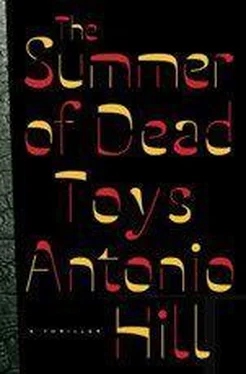Antonio Hill - The Summer of Dead Toys
Здесь есть возможность читать онлайн «Antonio Hill - The Summer of Dead Toys» весь текст электронной книги совершенно бесплатно (целиком полную версию без сокращений). В некоторых случаях можно слушать аудио, скачать через торрент в формате fb2 и присутствует краткое содержание. Жанр: Триллер, на английском языке. Описание произведения, (предисловие) а так же отзывы посетителей доступны на портале библиотеки ЛибКат.
- Название:The Summer of Dead Toys
- Автор:
- Жанр:
- Год:неизвестен
- ISBN:нет данных
- Рейтинг книги:4 / 5. Голосов: 1
-
Избранное:Добавить в избранное
- Отзывы:
-
Ваша оценка:
- 80
- 1
- 2
- 3
- 4
- 5
The Summer of Dead Toys: краткое содержание, описание и аннотация
Предлагаем к чтению аннотацию, описание, краткое содержание или предисловие (зависит от того, что написал сам автор книги «The Summer of Dead Toys»). Если вы не нашли необходимую информацию о книге — напишите в комментариях, мы постараемся отыскать её.
The Summer of Dead Toys — читать онлайн бесплатно полную книгу (весь текст) целиком
Ниже представлен текст книги, разбитый по страницам. Система сохранения места последней прочитанной страницы, позволяет с удобством читать онлайн бесплатно книгу «The Summer of Dead Toys», без необходимости каждый раз заново искать на чём Вы остановились. Поставьте закладку, и сможете в любой момент перейти на страницу, на которой закончили чтение.
Интервал:
Закладка:
However, at that moment footsteps resonated in the enormous corridor and a man of around thirty-five approached the office with various yellow files in his hand. The woman flashed a radiant smile.
“You’re in luck. Alfonso,” she said, turning to the new arrival, “this is Inspector. .”
“Salgado,” finished Héctor.
“Alfonso Esteve was Marc’s tutor in his last year here,” clarified the secretary, deeply satisfied.
The said Alfonso didn’t seem quite so satisfied and looked the visitors over, eyes reticent.
“Can I help you?” he asked after a moment or two’s hesitation. He was a man of short stature, no more than five foot seven, dressed in jeans, a short-sleeved, white-and-green checked shirt and trainers. Tortoiseshell glasses bestowed an overall air of seriousness. Before Salgado could answer, he put the yellow files on the counter. “Mercè, can you file them, please? They’re the September exams.” The secretary took them but didn’t move from the window.
“Could we talk somewhere?” Héctor asked. “Just for a few minutes.”
The teacher threw a sidelong glance at the secretary and she seemed to nod, not too convinced.
“I don’t know if the principal would approve,” he said eventually. “Our pupils’ files are private, you know.”
Héctor Salgado didn’t move a millimetre and his eyes seemed fixed on the teacher.
“All right,” he gave in, “we’ll go to the teachers’ lounge. It’s empty.”
The secretary looked disillusioned, but said nothing. Salgado and Castro followed Alfonso Esteve, who was walking rapidly toward one of the rooms at the other end of the corridor.
“Please, take a seat,” he said to them on entering, and closed the door. “Would you like a coffee?”
Leire saw a shining red coffee machine situated above a little fridge. Héctor answered before her.
“Yes, please.” His tone had changed and became much more approachable. “Holidays about to start?”
“Yes, they have already. And you?” The teacher smiled at Agent Castro while he put the capsule in the cafetiere.
“No, thank you,” she said.
“A little milk for me, please,” Salgado interjected. “No sugar.”
Alfonso brought the two coffees to the table. As soon as he sat down, a worried expression clouded his face. Before he could express his reservations, Inspector Salgado took the initiative.
“Listen, this is in no way an official visit. We just want to close this boy’s case, and there are certain things the family and friends can’t tell us. Details of his personality, his character. I’m sure you know your pupils well and have formed opinions of them. What was Marc Castells like? I’m not talking about academic results, more his conduct, his friends. You know what I mean.”
The teacher seemed visibly flattered and answered without hesitating.
“Well, strictly speaking, Marc was no longer my student. But he was a while back, for the last year of Secondary and the two years of Baccalaureate.”
“What do you teach?”
“Geography and history. It depends on the year.”
“And you were his tutor for the second year of Baccalaureate.”
“Yes. It wasn’t a good year for Marc. Let’s be clear, he was never a brilliant student or anything like it. In fact, he just finished Secondary and had to repeat first year, but up to then he’d never had any problems with conduct.”
Leire looked at the teacher with an expression of frank interest.
“And this changed?”
“He changed a lot,” confirmed Alfonso. “Although at the beginning we were happy about it. You see, Marc had always been a very timid, introverted boy, not much of a talker. One of those that go unnoticed in the classroom and, I’m afraid, out of it. I believe throughout all of Secondary I never heard his voice unless it was to answer a direct question. So it was a relief when he began to come out of his shell, in the first year of Baccalaureate. He was more active, less silent. . I suppose being at Aleix Rovira’s side woke him up.”
Héctor nodded. The name was familiar.
“They became friends?”
“I think the families already knew each other, but when Marc repeated and was in the same class they became inseparable. That’s normal in adolescence, and it’s clear this friendship favored Marc, at least academically speaking. Aleix is, without doubt, the most brilliant student this school has had in recent years.” He spoke with confidence and yet an ironic echo resonated in the phrase, a note of rancour.
“You didn’t get on with him?”
The teacher fidgeted with the coffee spoon, obviously unsure. Leire was going to repeat the reassuring murmur about the conversation being unofficial but Alfonso Esteve didn’t give her the time to do it.
“Aleix Rovira is one of the most complicated students I’ve ever had.” He noted that his comment required an explanation and so he continued. “Very intelligent, of course, and, according to the girls, quite attractive. Not at all the typical swot: he was as good at sports as he was at mathematics. A born leader. I suppose it’s not surprising: he’s the youngest of five siblings, all boys, all strictly educated in what we might call ‘Christian values.”” He paused. “In his case, a serious problem in his childhood has to be factored in: he had leukaemia, or something like it. So it’s even more commendable that once recovered he was always top of the class.”
“But?” Héctor smiled.
“But,” Alfonso stopped again, “but there was something cold in Aleix. As if he’d seen it all before, as if his intelligence and the experience of his illness had given him a. . cynical maturity. He had the group wrapped around his little finger, and some teachers as well. Being top of the class, the best in the history of the school, and the memory of his battle against cancer gave him a type of insensitivity to everything.”
“Are you talking about bullying?” asked Leire.
“That would be stating it too strongly, although there was some. Biting comments directed toward the less clever or less attractive; nothing you could accuse him of, but it was clear the whole year did what he wanted. If he was rude to one of the teachers, they all copied him; if he decided one must be respected the rest did the same. Anyway, this is only my opinion; most people think he is a charming boy.”
“You seem quite convinced of this opinion, Señor Esteve,” pressed Castro. She sensed there was something else and didn’t want the teacher to leave it unspoken.
“Listen, me being sure is one thing; it being the truth is something very different.” He lowered his voice, as if he were going to tell them a secret. “A school is a rumor factory and it’s difficult to establish their origin; they emerge, they spread, they’re discussed. They start in a whisper, hidden from the person concerned; then they become louder until in the end they explode like a bomb.”
Both Salgado and Castro still stared at him, willing him to continue.
“There was a teacher, not so young, forty-something. She arrived when Aleix and Marc were doing First Bacc together. For some reason, she and Aleix didn’t get on. It’s strange, because he usually made an effort to have a rapport with the female teachers. The rumors began immediately, of every kind. No one knows much about what happened, but she didn’t last the year.”
“And you believe those rumors came from Aleix?”
“I’d swear they did. One day she didn’t come to work and I subbed for her. Aleix had an expression of cruel satisfaction, I’m sure.”
“And Marc? ”
“Well, poor Marc was his number-one fan. His father had remarried and I think his wife couldn’t have children, so they adopted a little Chinese girl. That meant trips, absences. . Marc needed someone in his corner, and that someone was Aleix Rovira.”
Читать дальшеИнтервал:
Закладка:
Похожие книги на «The Summer of Dead Toys»
Представляем Вашему вниманию похожие книги на «The Summer of Dead Toys» списком для выбора. Мы отобрали схожую по названию и смыслу литературу в надежде предоставить читателям больше вариантов отыскать новые, интересные, ещё непрочитанные произведения.
Обсуждение, отзывы о книге «The Summer of Dead Toys» и просто собственные мнения читателей. Оставьте ваши комментарии, напишите, что Вы думаете о произведении, его смысле или главных героях. Укажите что конкретно понравилось, а что нет, и почему Вы так считаете.












